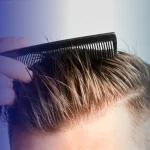
Table Of Content
There are many things that you are not always told about, as a pregnant woman, about what to expect after giving birth. One of these is the possibility of experiencing post-partum hair loss in the days, week or even in some cases, months after the event. Some women can experience the condition for just one of their births, while others suffer from hair loss after pregnancy each time.
Post-pregnancy hair loss can manifest in various ways, a common one being the apearence of bald patches around the hairline. Other see their hair growing finer in quality, with the loss of some of its previous density and length.
It is quite normal for women to experience hair loss during pregnancy and shortly after giving birth. It can be particularly noticeable in the first two to six months post-partum, as the body recovers and regroups after child birth, breastfeeding and the related fluctuations in health and hormone levels. It is estimated that around 90% of women will experience hair loss to one degree or another, although many may not even realise it, if the loss is mild.
The normal rate of post-partum hair loss is around 400 hairs per day – up on the typical 80 hairs per day that the average person loses in general. You may see these strands on your pillow or when you shower, but this should not be the cause of alarm unless the hair loss seems more extreme. It should also die down by around six months after birth, so if you are still losing hairs at a more intense rate after then, it is worth seeking medical advice. Don’t forget that looking after a new-born can be extremely stressful, so it is important to make sure that any extended hair loss symptoms are not related to excessive worry or anxiety.
Post-partum hair loss is mainly caused by a surge in the woman’s oestrogen and progesterone hormone levels during her pregnancy. The extra oestrogen stops the hair from entering its natural shedding phase as it normally would at certain times of the year, so the hair that would usually fall out as a matter of course stays put during pregnancy. This leads to hair remaining in a heightened state of growth, creating thicker, shiny strands that make everything look lustrous and healthy.
Thicker hair is often seen as one of the more positive side-effects of the nine months of pregnancy. Immediately after giving birth, however, hormones fall back to a more normal level, moving the hair into a ‘resting’ stage while normal growth patterns are re-established by the body. Hair is more prone to fall out during this stage, although new hair will usually grow back, usually along the hairline.
Another possible reason for post-partum hair loss that seems more excessive can be a change in your ferritin levels – blood cell proteins that help your body to store iron. This can affect the thyroid and lead to hyperthyroidism. It can also lead to iron deficiencies, so ask your doctor for a diagnostic blood test if you are concerned that this factor may be at play. If this is not the cause and you are still concerned, there are several different treatments you can take to help slow hair loss and encourage healthy regrowth.
Anyone seeking the answer to the question how to stop post-partum hair loss is able to consider several different approaches to the issue at hand. First of all, take steps to ensure your overall good health during what is a very busy time caring for your new son or daughter. Eat well, take plenty of time to sleep and accept any and all offers of help with things like the housework to help you stay calm and focused on yourself and your new arrival.
Choose foods that support and are beneficial to your blood sugar levels, as well as those that contain enough iron, ferritin, protein, zinc and Vitamin D. If you are particularly wanting to reverse the effects of hair loss, there are specialist post-partum hair loss vitamins available that can be added to the daily routine very easily. Always check with your doctor or midwife if you are unsure what to take.
Use a post-partum hair loss shampoo to help stimulate the hair follicles and kick-start new growth. Shampoo your hair frequently to keep it healthy and clean and free from any bacteria or substances that could impede new growth. If you do have balding patches that you feel self-conscious about, think about changing your parting to hide them or wearing colourful scarves, headbands or hats to distract the eye. You could indulge in an all-new hairstyle with a more dramatic trim than you have had before, or turn heads with a brand new hair colour.
If you are still concerned about the amount of hair you are losing after pregnancy, or the length of time the loss is going on for, then you should seek medical advice. There are all kinds of creams and lotions that you can try to help stimulate regrowth, as well as treatment such as scalp massages (with the added bonus of grabbing yourself some relaxing me-time…) and using a hairbrush with natural bristles – avoid hard bristles or metal-toothed combs that can lead to excess hair breakage.
Finally, there is the option of booking in for female hair transplant surgery. This is a more radical procedure for serious cases, but can produce pleasing results for people who are experiencing male or female pattern baldness or who are especially concerned about extended hair loss and the effects of alopecia. Your doctor or dermatologist can refer you to a hair transplant expert, who will talk you through your various options. You must ensure that you are in a fit state to undergo the surgery and can have the appropriate calmness, space and after-care support to help you to recover correctly, quickly and safely afterwards. Research should be done to choose a good clinic and doctor for female hair transplant surgery. At the same time, the cost of female hair transplant surgery should also be investigated. At this point, Turkey stands out as an important location for women’s Turkey hair transplantation operations. Because Turkey hair transplant cost is more affordable compared to other countries. Qualified clinics and specialist doctors in Turkey offer solutions for those experiencing female pattern baldness.




